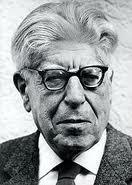
It is one of the most important philosophers of the twentieth century. Since his first book, The Spirit of Utopia, revealed what would be their primary concern: the study of the concept of utopia in all its manifestations. Deepening the philosophical legacy of Marx (which for him can not be separated from the relationship with Hegel, the only philosopher who devoted a monograph Bloch, Subject-Object. Hegel's thought) led him to try to expand the possibilities original way theory of Marxism to make it a "utopian Marxism" true incarnation of the "concrete utopia". Bloch's main concerns were reflected in his most important work, The Principle of Hope, true synthesis of his thought. His concern for the religious dimension of human beings led him to write a monograph on Thomas Müntzer (Thomas Müntzer, theologian of the revolution) and one of the most passionate reconsiderations of religion from Marxist theory, Atheism in Christianity. Fidelity to their own ideas led Bloch to undertake often the path of exile in Switzerland during the First World War; by various European countries during the Nazi era, reaching the United States, where he remained during the years of the Second World War. After the war, he taught at Leipzig, but his disagreements with the regime of the GDR led him to settle, following the construction of the Berlin Wall, in Tübingen, where he ended his years of teaching.




